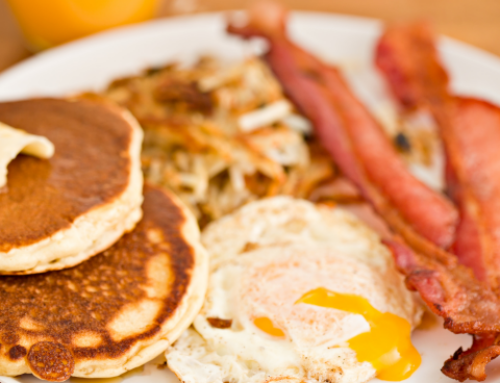The Nutrition That Powers Joe Thomas’s Iron-Man Streak
![]()
Cleveland Browns offensive tackle Joe Thomas hasn’t missed a play in nine years of professional football. Playing one of the most physically punishing positions in sports, the 6-foot-6, 312-pounder has been on the field for 7,917 consecutive snaps—the longest current streak in the NFL. Combine that with Thomas’s recent selection to his eighth consecutive Pro Bowl, and it’s easy to see why his name is synonymous with “consistency” and “dominance.”
Ask Thomas how he has stayed healthy through all of the years (and all of the hits), and he’s quick to talk about the important role of nutrition. Proper eating is a big deal to the big man, who’s an avid gardener when he’s not on the field. During a recent visit to a Cleveland area high school, Thomas shared some of the secrets of his success. Check out STACK’s entire interview with Thomas in the video player above.
How He Bulked Up
Thomas wasn’t always the brawny man mountain you see today. He said, “In high school, I was always a skinny kid.” He faced a challenge that many young football players know all too well—he couldn’t keep enough weight on. To bulk up, he called in two old friends—peanut butter and jelly sandwiches, and whole milk.
“As a kid you eat your three meals, but you have to find other times in the day to put calories in your body that will help build muscle and gain weight,” Thomas said. “My tip is take a full loaf of bread, make every single slice into a PB&J, cut it in half, and then every hour between meals have half a PB&J and drink some whole milk. You’ll definitely gain weight.”
He Recovers Fast by Refueling Fast
Over his long professional career, Thomas has learned much about the crucial role nutrition plays in recovery. He said, “One thing I know now as a pro athlete that I wish I had known as a high school athlete is the importance of putting fuel back into your body right after a practice, game or any type of strenuous activity.” He eats a meal high in protein right after his workouts, and he said that it plays a big role in helping his body recover and build muscle. “I think my ability to stay on the field and not be injured is from a lot of things. But I would say one of the big things is definitely the nutrition I have and the way I try to eat.”
He Eats a Bear-Sized Breakfast
Every morning during the season, Thomas devours a huge quantity of food to prepare him for the tough day ahead. “Since I burn so many calories, I have to eat a little more than I do out of season. I’ll have a big yogurt with granola and fresh fruit, pancakes and sometimes an egg sandwich, too. I need a few extra calories,” Thomas said. In the off-season, he keeps it pretty simple. “Sometimes some oatmeal with milk and peanut butter in it. And then a little OJ on the side.”
RELATED: Why Athletes Should Never Skip Breakfast
He Says “Yes” to Yogurt
Thomas says he eats yogurt on a daily basis. “Yogurt is one of the best foods you can have,” he said. “I eat it a lot more now than I did when I was younger. It’s something I eat a lot of in the morning. It’s good for you and tastes really good. And if you eat yogurt that has live and active cultures, it’s good for the bacteria in your stomach.”
Live and active cultures, also known as probiotics, have numerous health benefits, including improved digestive function, a stronger immune system and enhanced nutrient absorption. The high protein content in yogurt is also great for building muscle, helping Thomas handle the mammoth defensive linemen he battles in the trenches.
RELATED: The Healthy Athlete’s Guide to Yogurt
He’s a Green Giant
When he isn’t busting his butt as the anchor of the Browns’ offensive line, Thomas unwinds with one of his favorite hobbies—gardening.
“I’ve been growing a garden for about six or seven years,” he said. “With a little bit of water and a little bit of fertilizer, you can get this huge bounty of fresh vegetables and fruits.”
Fruits and vegetables are extremely nutrient-dense foods—meaning they’re low in “empty” calories and high in useful nutrients. They’re also chock full of antioxidants, which combat muscle inflammation, colds, flus, heart disease and cancer.
RECOMMENDED FOR YOU
MOST POPULAR
The Nutrition That Powers Joe Thomas’s Iron-Man Streak
![]()
Cleveland Browns offensive tackle Joe Thomas hasn’t missed a play in nine years of professional football. Playing one of the most physically punishing positions in sports, the 6-foot-6, 312-pounder has been on the field for 7,917 consecutive snaps—the longest current streak in the NFL. Combine that with Thomas’s recent selection to his eighth consecutive Pro Bowl, and it’s easy to see why his name is synonymous with “consistency” and “dominance.”
Ask Thomas how he has stayed healthy through all of the years (and all of the hits), and he’s quick to talk about the important role of nutrition. Proper eating is a big deal to the big man, who’s an avid gardener when he’s not on the field. During a recent visit to a Cleveland area high school, Thomas shared some of the secrets of his success. Check out STACK’s entire interview with Thomas in the video player above.
How He Bulked Up
Thomas wasn’t always the brawny man mountain you see today. He said, “In high school, I was always a skinny kid.” He faced a challenge that many young football players know all too well—he couldn’t keep enough weight on. To bulk up, he called in two old friends—peanut butter and jelly sandwiches, and whole milk.
“As a kid you eat your three meals, but you have to find other times in the day to put calories in your body that will help build muscle and gain weight,” Thomas said. “My tip is take a full loaf of bread, make every single slice into a PB&J, cut it in half, and then every hour between meals have half a PB&J and drink some whole milk. You’ll definitely gain weight.”
He Recovers Fast by Refueling Fast
Over his long professional career, Thomas has learned much about the crucial role nutrition plays in recovery. He said, “One thing I know now as a pro athlete that I wish I had known as a high school athlete is the importance of putting fuel back into your body right after a practice, game or any type of strenuous activity.” He eats a meal high in protein right after his workouts, and he said that it plays a big role in helping his body recover and build muscle. “I think my ability to stay on the field and not be injured is from a lot of things. But I would say one of the big things is definitely the nutrition I have and the way I try to eat.”
He Eats a Bear-Sized Breakfast
Every morning during the season, Thomas devours a huge quantity of food to prepare him for the tough day ahead. “Since I burn so many calories, I have to eat a little more than I do out of season. I’ll have a big yogurt with granola and fresh fruit, pancakes and sometimes an egg sandwich, too. I need a few extra calories,” Thomas said. In the off-season, he keeps it pretty simple. “Sometimes some oatmeal with milk and peanut butter in it. And then a little OJ on the side.”
RELATED: Why Athletes Should Never Skip Breakfast
He Says “Yes” to Yogurt
Thomas says he eats yogurt on a daily basis. “Yogurt is one of the best foods you can have,” he said. “I eat it a lot more now than I did when I was younger. It’s something I eat a lot of in the morning. It’s good for you and tastes really good. And if you eat yogurt that has live and active cultures, it’s good for the bacteria in your stomach.”
Live and active cultures, also known as probiotics, have numerous health benefits, including improved digestive function, a stronger immune system and enhanced nutrient absorption. The high protein content in yogurt is also great for building muscle, helping Thomas handle the mammoth defensive linemen he battles in the trenches.
RELATED: The Healthy Athlete’s Guide to Yogurt
He’s a Green Giant
When he isn’t busting his butt as the anchor of the Browns’ offensive line, Thomas unwinds with one of his favorite hobbies—gardening.
“I’ve been growing a garden for about six or seven years,” he said. “With a little bit of water and a little bit of fertilizer, you can get this huge bounty of fresh vegetables and fruits.”
Fruits and vegetables are extremely nutrient-dense foods—meaning they’re low in “empty” calories and high in useful nutrients. They’re also chock full of antioxidants, which combat muscle inflammation, colds, flus, heart disease and cancer.











